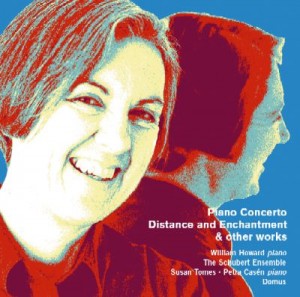Student demands more women composers in school exams
mainA 17 year-old student, Jessy McCabe, has launched a petition calling for more women to be represented in the UK ‘A’ Levels music exams.
Jessy writes:

The current 2008 Edexcel A-Level Music syllabus has a total of 63 different set works from a variety of musical genres and eras. Yet not a single one of these set works was composed by a woman.
She’s right. Read her petition here, and sign if you agree.
So far, Jessy has 1,038 signatures.
It may have escaped the authorities’ attention that the present Master of the Queen’s Musick is…






Probably also a case could be made to include more black, Chinese, gay and contemporary composers. Why are dead white males from such restricted, underdeveloped culture repeated over and over again? What could a contemporary kid hope to learn from that? It is about time that we get rid of classical music and put something more just in its place, something that better reflects modern society. For instance, I cannot stop being scandalized by the increasing number of female conductors that you see nowadays…. they succumb to the patriarchal culture that has characterized music life for so long: they imitate their male examples!
Whether it’s some dude saying women can’t do what we do or some other dude saying women shouldn’t, I’m still not in the mood to take seriously either kind of dude who thinks he gets to tell us what to do.
And since when it 800 years worth of music written on several continents “a” culture, underdeveloped or not?
Good on that kid. I’m tired of top-ten lists of old white guys made by old white guys. Anybody who listens to Duke Ellington, Mary Lou Williams, or Amy Beach and doesn’t count them in the category of “stuff we’ll still be listening to in 150 years” — which is all classical music really is — is nuts.
I remember an article about Clara Schumann on NPR where they were talking about her as a severely undeerappreciated and underperformed composer and the fact that she “inspired” some Brahms stuff. They had a cute little poll where readers could choose what they wanted to listen to — some of her stuff or whatever it was claimed she “inspired” in Brahms.
People picked the Brahms by some huge percentage. That sort of shit gets on your nerves after a while. Yeah yeah, we admire chick composers and all … but we don’t want to hear them.
Neither do you, it appears. Same old same old, for all your self-image as standing in opposition to The Establishment.
I was merely being ironic…. With all the emancipation movements the danger is that emancipation is considered more important than substance, and that would be undermining the art form as such. This part of your comment demonstrates what I mean:
“Anybody who listens to Duke Ellington, Mary Lou Williams, or Amy Beach and doesn’t count them in the category of “stuff we’ll still be listening to in 150 years” — which is all classical music really is — is nuts.”
With all due respect, but these are not serious composers, but composers of entertainment music. They may be or become ‘classics’ within the entertainment genre, but it is really nutty to compare them with the classical composers that form the core of the traditional repertoire.
(And by the way, I am FOR the classical establishment – i.e. the central performance culture – and merely AGAINST the new music establishment, which is another category. The classical establishment is, with all its problems and flaws, our only hope on the preservation of an important cultural asset.)
How do we draw a distinction between serious music and entertainment? Indeed, does such a distinction exist? Wynton Marsalis said of Louis Armstrong, “He left an undying testimony to the human condition in the America of his time”. I would prefer just to say, “He left an undying testimony to the human condition”. Certainly I would not consider Louis Armstrong to be merely entertainment. What is merely entertainment music? One Direction, certainly, but where do we draw the line? Arguably much music within the classical canon was originally composed for entertainment purposes.
Of course there are territories where the genres overlap. But the things we expect from Ellington should be different from what we expect from Bach, as with Piazzola and Mahler. It is all music, yes, but that does not mean there are no fundamental differences. It is not merely one big soup. The moment that Brahms is considered entertainment, classical music has died, in spite of Brahms’ wish that he had composed the Blue Danube waltz.
Also the idea of ‘entertainment’ can be understood in different ways. But the important works that form the core of the repertoire – which may vary in time but that does not diminish its raison d’être – raise above mere entertainment. Especially nowadays, when society as a whole is gradually sinking into decadence and udnerstanding of all culture is eroding, ‘defending’ the notion of ‘entertainment’ is suicidal.
I love Ellington but will never confuse his work with a Bruckner symphony and where it comes from. That’s not elitism, but only fair to both Ellington and Bruckner.
I have to think of Wagner’s Bayreuth where he installed hard, functional seats, and turned the lights out during performances, to burn all wish for ‘entertainment’ from the audience’s souls… A bit drastic but understandable if you read about the opera world of his days which was almost totally dedicated to ‘entertainment’ and social representation.
The proportion of not-very-good composers, of people who can’t compose at all and of tone-deaf people also fails to reflect the population as a whole. Something should be done!
Good for Jessy McCabe
I look forward to seeing Nicola Lefanu on the school syllabus.
It comes down to which composers are the most illustrative of the history of music, or, put another way, which composers have had the greatest impact on the history of music. I don’t see Nicola LeFanu, Mary Lou Williams, Amy Beach, or Clara Schumann as being, by that criterion, as important as, say, Haydn, Beethoven, Wagner, or Schoenberg.
Please. When a woman’s body of work is completely ignored in favor of third and fourth rate males because woman automatically equals unimportant, that becomes a self-fulfilling prophecy.
I am wondering which of Haydn, Beethoven, Wagner, and Schoenberg you consider third or fourth rate. I was not suggesting that anybody should completely ignore a woman’s body of work, or that a female composer is necessarily unimportant. I was suggesting that a syllabus of illustrative examples of the history of music would necessarily have to emphasise the study of composers whose work has tended to exert the greatest influence in the history of music. Surely you do not believe that Amy Beach was more influential than Beethoven in the history of western art music.
Funny how you conveniently skipped over Duke Ellington, whom I also mentioned. How might you rate his importance?
Awaiting the legalistic fine-print argument sure to come about how well, the specific petition mentioned only women composers …
Since Duke Ellington was not a woman and is already on the A-level music syllabus anyway I didn’t think that that point required a specific reply.
Whether composers have ‘the greatest impact’ on music history, has nothing to do with their artistic value. Bach was undervalued as a composer during his life time and became an influence only in the 19C, which dwindled again in the 20C. Almost ALL composers from before Bach had entirely disappeared, until Vivaldi was rediscovered half a century ago, and later-on Monteverdi, and the impressive repertoire of the ‘early music movement’. Brahms had only a very restricted influence upon music history, but he belongs to the most often performed ‘classics’ next to Beethoven. Haydn had a much greater influence than Mozart, but it is Mozart who is much more valued and performed. Strictly speaking: Mozart was not a ‘progressive’ composer at all since he did not ‘extend’ or ‘renew’ the ‘musical language’.
It is really two different things… history or artistic value and importance.
Your comment sounds like Daniel Barenboim, who sees music history as a linear narrative, on which the nodes of the most ‘progressive’ works determine the course. And that is nonsense and a grave falsification of historical reality.
Another consideration may be that histories are often mere projections of current obsessions. Over the last 50 years, such obsession has been ‘progress’ (which is a nonsensical notion in art). While unusually original works draw much attention (and when they are good, deservedly so), lots of things are continuing as before, but they do not scream it from the roof tops. Then there are the works which have no impact at all, but are only appreciated much later, like Beethoven’s late string quartets.
I would agree with much of that, and perhaps did not express myself as well as I could have done. I agree entirely about Haydn, and that is why I mentioned him rather than Mozart. Of course, it is important for students to be made familiar with the finest examples of music, and that is why I would expect both Haydn and Mozart to be set.
Ah but she’s wrong, there is at least one woman on the list, “J.S. Bach”! 😉
Perhaps we should make this murky, smells-of-bandwagon case a bit clearer: there are 63 works in the anthology, but fewer than 63 composers: some composers are featured several times, and quite a few of the works are not “Western Classical” i.e. they are pop songs, “world music”, etc. And one of those is by a Cuban family that includes a woman. But apart from that, yes, all the classical works are by men. Perhaps that could be excused up to, say, the 1920s, as the names present are the indisputably great and obvious ones (Haydn, Mozart, Beethoven, and so on), but it would be historically more appropriate if there were at least one woman from the 20th or 21st centuries – representative of growing equality in historiographical and public discourse, surely the basic function of an anthology.
The living composers selected are not especially “classical” composers; indeed, they are film music composers (John Williams, Jerry Horner, Jerry Goldsmith) plus Barrington Pheloung, best known for the theme tune to Inspector Morse.
(I remember my GCSE music, a long long time ago, had an anthology featuring Elisabeth Lutyens and John Casken as the standard-bearers of contemporary classical music. Sic transit, etc.)
Surely the real scandal about anthologies such as this is the disregard for any living composer NOT working primarily in a commercial context? You know – John Adams, Steve Reich, Louis Andriessen, Penderecki, … there is not exactly a shortage. Nor indeed is there a shortage of the many excellent female composers well known these days, shaping today’s history of music. It does seem a bit of an embarrassing oversight.
The anthology table of contents can be read on Amazon if anyone’s interested.